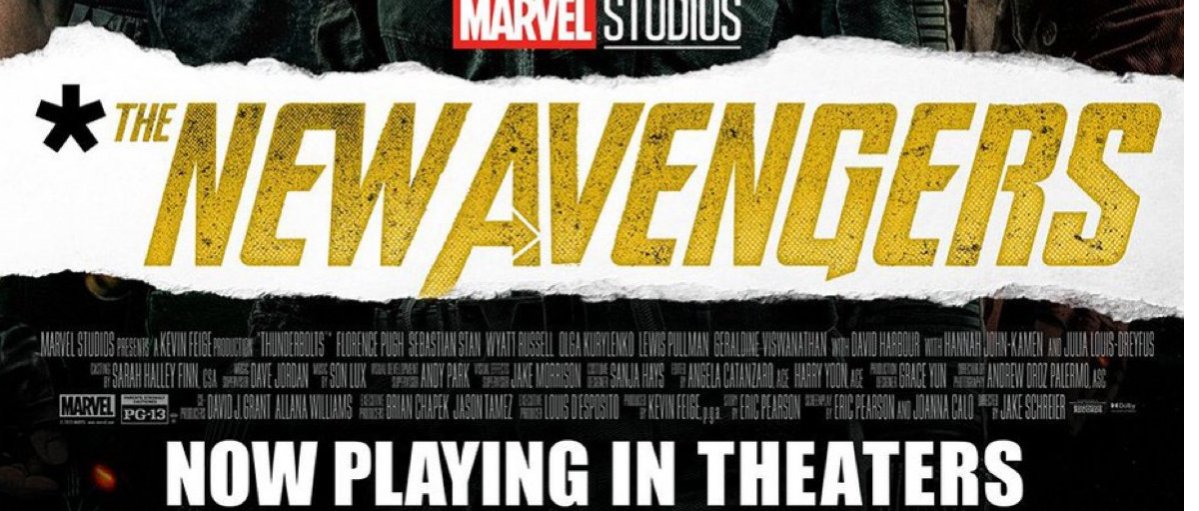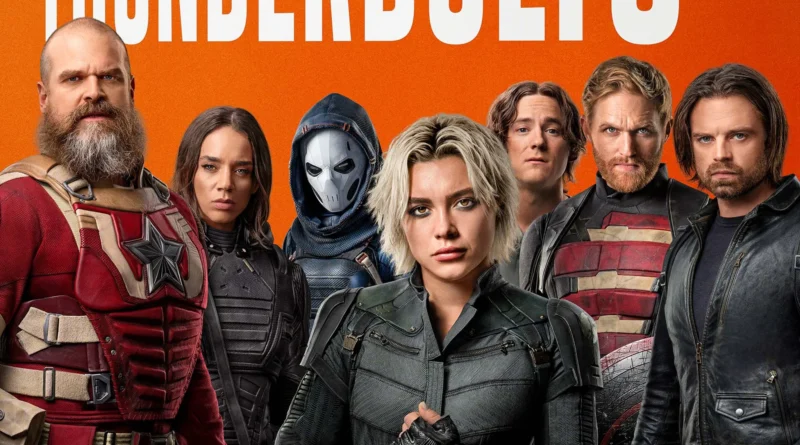Why Thunderbolts* Works
Marvel Studios’ Thunderbolts* came out on May 2nd, and the world has never been the same since. It’s been a long while since I felt that the Marvel Cinematic Universe was in working condition, but Thunderbolts* has changed my mind, inspiring hope that Marvel can get their act together after almost a half decade of aimlessness and general disappointment. So how did this ragtag group of misfits and B-listers correct the trajectory of the largest cinematic endeavor in history?
Starting with a quick, spoiler-free review: go watch this movie. It’s worth seeing because not only is it a damn good flick, but also informs how the rest of the MCU’s current phase will play out. Between its action and character work, we’ve got a modern Marvel classic on our hands. If you’re bored with the MCU, this is the shot in the arm that you’ve begged for. Give the Thunderbolts a chance. You won’t regret it.
Spoilers Below:
I did not want to see this movie. I was turned off by the cast, namely Black Widow (2021) characters like Yelena Belova (Florence Pugh), Red Guardian (David Harbour), and Taskmaster (Olga Kurylenko,) but also many of them being super soldiers lacking any bombastic powers. Before trailers rolled in, I wrote this movie off as the standard found family superhero film we’ve been making since the first Guardians of the Galaxy (2014). I mean, Black Widow tried the same shtick to an appallingly inept degree, and Thunderbolts* having so much connective tissue to that film was a bad omen. I was also annoyed by the co-opting of the Thunderbolts name from the comics, which first began as a team of “heroes” who turned out to be villains in disguise, but now serves as a generic name for any team of anti-heroes Marvel Comics wants to put together. Already, Thunderbolts* had pissed off the jaded MCU fan as well as the comic purist in me—so what changed?
I was won over by the film’s trailers and the word of mouth that was spreading. That, and the promotional material was getting creative, especially with integrating the mysterious asterisk from the film’s title. By degrees, this was looking like a real movie, not some disposable chapter in the grand tapestry of the MCU. The final piece of the puzzle was Bob. Lew Pullman’s Bob Reynolds is the film’s standout character, the glue that holds the story together. Adding The Sentry, a relatively recent comic book creation, sparked curiosity in me, and his inclusion and execution proved to me that the MCU might still have the ability to make stories that mean something.
What makes Thunderbolts* a refreshing entry in the MCU is that it pulled off the tightrope walk that its earliest films could: telling its own story while towing the shared-universe line. As its own movie, it deftly maneuvers its ensemble cast, who are all established characters from previous Marvel projects. While I expressed my exhaustion with Yelena and Red Guardian, this movie was able to turn me around on them by giving them depth and relatable struggles. As The Falcon and The Winter Soldier’s (2021) strongest champion, I’ve always thought John Walker/U.S.Agent (Wyatt Russel) was one of the MCU’s best new additions. Hannah John-Kamen’s Ghost isn’t a major player, but she has great chemistry with the rest of the cast, and Bob rounds things out nicely.
The Sentry has always been a fascination of mine since he was the subject of a hoax that Marvel perpetuated in promoting his 2001 miniseries by writer Paul Jenkins and Jae Lee. The mini’s premise was that The Sentry was a superhero that the Marvel universe forgot, so as a stunt, Marvel made sketches of a 60’s era Sentry, supposedly created by the late Stan Lee. I read Jenkins and Jae Lee’s original mini before seeing Thunderbolts*, and I think the film did a great job of sticking to the core of the character while conforming him to the MCU. It leaves out the universe forgetting him to double down on his mental health struggles, which provide a thematic runway for the movie to take off from. Lewis Pullman embodied the instability of this character, as he comes off as timid and anxious one moment, and crackling with power in the next.

Some might call it corny, but I found the film’s themes about emotional vulnerability and sharing one’s struggles with others to be touching. The Void, the personification of Bob’s mental health, as well as that of the other characters, was a terrifying and visually captivating presence. His stark black silhouette and beady white eyes will surely haunt my psyche for years to come. Being a villain the team couldn’t simply pummel into submission made the team act with their hearts instead of their fists. I was so ready to reject this film’s flimsy attempt at a found family narrative, but I was genuinely engaged by the relationships forged between the cast, between Yelena and Bob especially, whose connection becomes the heart of the film. Marvel has successfully created a new oddball pairing that will keep fans coming back just to see them.
The movie doesn’t try to convince you that the Thunderbolts are anything they’re not, only that given the chance, they can be more, and that’s a far more believable proposition. Unlike the Suicide Squad films, the audience isn’t beaten over the head with the fact that these characters will be friends. Laced into the story were little moments of trust and compassion between the cast, like Walker pulling through on Yelena’s escape plan, or Ghost picking up Bucky’s arm that are of way more value than some speech about friendship or togetherness. They’re still selfish, desperate, and stupid, but because they’re people, and people contain multitudes, they can be good, too.
Thunderbolts* also plays the shared-universe game by asking questions about the status quo, ones that deal directly with the absence of the Avengers and other major heroes. Julia Louis-Dreyfous’ Valentina Allegra de Fontaine addresses the vacant state of the universe by creating The Sentry, and that plays a large part in my affection for this movie. Instead of downplaying the vacant state of the MCU, the film takes the opportunity presented by the status quo and makes it an advantage. The film uses the meta-narratives around it (like the end credits calling out that “nobody wanted” these characters) to catapult itself forward, a lot like how these characters defy expectations about themselves. Another stroke of brilliance is the reveal behind the title’s asterisk.
If you’re like me, then you were spoiled for the film’s true title, The New Avengers, by the overzealous marketing. Thunderbolts* smartly positioned itself in the shadow of the Avengers franchise throughout its promotional cycle, but the final reveal and post-credit scene cemented this as essential viewing for the future of the MCU. I like the title reveal, as it explains the asterisk, and, like the original Sentry hoax, is a fun viral marketing gimmick to get the people going. I wish they held off for a while, though, as I caught the spoiler the very night before viewing.

As a lapsed MCU fan, things finally feel like they’re back on track. The Avengers stood as the cornerstone of the MCU, and with them gone, what followed was an era defined by directionlessness. With a new team, the North star of this franchise is back, and paradoxically, it makes me fear for the next Avengers film, Avengers: Doomsday. Quite frankly, I’m done with the multiverse. As a Hollywood trend, I figured we had all agreed that its run its course, and after Thunderbolts* solidified a new vision for the team, it would be a shame to see them backslide. It would be a shame to rely on cheap cameos and nostalgia when we’ve just built something so new and engaging.
Thunderbolts*, or rather, The New Avengers, has many people crying “The MCU is back!” and it’s hard to disagree with them. It’s a great film that sets itself apart from other Marvel fare by having it where it counts: character. It was able to redeem a cast that I had given up on all while having a unique identity as a film with its mature take on the genre’s tropes and a fresh approach to marketing. Thunderbolts* isn’t special just because it’s revived interest in Marvel films, but because it made me feel something. I felt hope that Marvel can make superhero flicks about real things again, and that’s what Marvel’s all about; the world outside your window.

